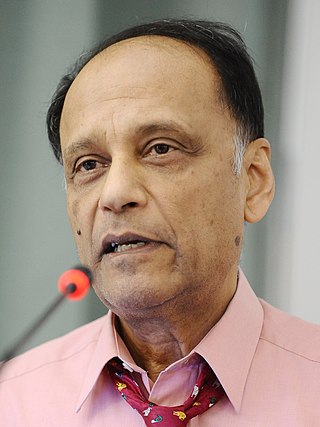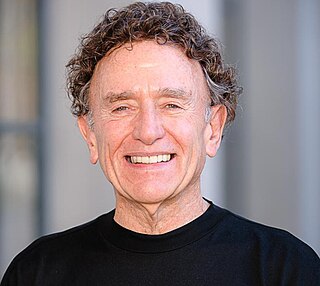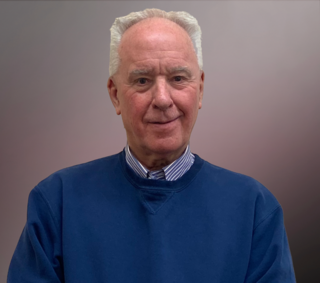Related Research Articles

Edward Christian Prescott was an American economist. He received the Nobel Memorial Prize in Economics in 2004, sharing the award with Finn E. Kydland, "for their contributions to dynamic macroeconomics: the time consistency of economic policy and the driving forces behind business cycles". This research was primarily conducted while both Kydland and Prescott were affiliated with the Graduate School of Industrial Administration at Carnegie Mellon University. According to the IDEAS/RePEc rankings, he was the 19th most widely cited economist in the world in 2013. In August 2014, Prescott was appointed an Adjunct Distinguished Economic Professor at the Australian National University (ANU) in Canberra, Australia. Prescott died of cancer on November 6, 2022, at the age of 81.
David William Pearce OBE was Emeritus Professor at the Department of Economics at University College London (UCL). He specialised in, and was a pioneer of, environmental economics, having published over fifty books and over 300 academic articles on the subject, including his 'Blueprint for a Green Economy' series.

Sir Partha Sarathi Dasgupta is an Indian-British economist who is Frank Ramsey Professor Emeritus of Economics at the University of Cambridge, United Kingdom, and a fellow of St John's College, Cambridge.
The W. P. Carey School of Business is the business school of Arizona State University and is one of the largest business schools in the United States, with over 300 faculty, and more than 1,582 graduate and 15,077 undergraduate students. The school was named for William Polk Carey following his $50 million gift in 2003. In 2020, the W. P. Carey School was ranked 21st in the world for economics and business by Shanghai Jiao Tong University's Academic Ranking of World Universities. In 2020, U.S. News & World Report ranked 30 W. P. Carey academic disciplines in the top 25.

John Quiggin is an Australian economist, a professor at the University of Queensland. He was formerly an Australian Research Council Laureate Fellow and Federation Fellow and a member of the board of the Climate Change Authority of the Australian Government.

Elinor Claire "Lin" Ostrom was an American political scientist and political economist whose work was associated with New Institutional Economics and the resurgence of political economy. In 2009, she was awarded the Nobel Memorial Prize in Economic Sciences for her "analysis of economic governance, especially the commons", which she shared with Oliver E. Williamson; she was the first woman to win the prize.

The Ira A. Fulton Schools of Engineering is the engineering college of Arizona State University. The Fulton Schools offers 25 undergraduate and 48 graduate degree programs in all major engineering disciplines, construction and computer science. In 2023 the Fulton Schools became the first university in the nation to offer a bachelor's degree, master's degree and doctoral degree in manufacturing engineering.

Leonid Hurwicz was a Polish–American economist and mathematician, known for his work in game theory and mechanism design. He originated the concept of incentive compatibility, and showed how desired outcomes can be achieved by using incentive compatible mechanism design. Hurwicz shared the 2007 Nobel Memorial Prize in Economic Sciences for his seminal work on mechanism design. Hurwicz was one of the oldest Nobel Laureates, having received the prize at the age of 90.

Gordon Rausser is an American economist. He is currently the Robert Gordon Sproul Distinguished Professor Emeritus, Dean Emeritus, at Rausser College of Natural Resources and more recently, a professor of the graduate school at the University of California, Berkeley. On three separate occasions, he served as chairman of the Department of Agriculture and Resource Economics, served two terms as Dean of the Rausser College of Natural Resources, and has served on the board of trustees of public universities and one private university. Rausser has been appointed to more than 20 board of directors of both private and publicly traded companies, including chairman of several of such boards.
Paul Lewis Joskow is an American economist and professor. He became President of the Alfred P. Sloan Foundation on January 1, 2008. He is also the Elizabeth and James Killian Professor of Economics, Emeritus at MIT. He has served on the MIT faculty since 1972. From 1994 through 1998 he was Head of the MIT Department of Economics. From 1999 through 2007 he was the Director of the MIT Center for Energy and Environmental Policy Research. Since rejoining in 2018 from his 1988-2007 term, Professor Joskow is Research Associate on the National Bureau of Economic Research (NBER).

Daniel W. Bromley is an economist, the former Anderson-Bascom Professor of applied economics at the University of Wisconsin–Madison, and since 2009, Emeritus Professor. His research in institutional economics explains the foundations of property rights, natural resources and the environment; and economic development. He has been editor of the journal Land Economics since 1974.

Henry P. Caulfield Jr. was an American political scientist who had a long and distinguished career in public service with the U.S. Department of the Interior, culminating as the first director of its U.S. Water Resources Council, before becoming professor of political science at Colorado State University. He served on many boards and advisory committees and as a consultant to water resources agencies worldwide, and received awards for his service. Caulfield was born in New York City, and died in Fort Collins, Colorado, where he retired in 1986.
Jock Robert Anderson is an Australian agricultural economist, specialising in agricultural development economics, risk and decision theory, and international rural development policy. Born in Monto, Queensland, he studied at the University of Queensland, attaining bachelor's and master's degrees in agricultural science. After graduation, Anderson joined the Faculty of Agricultural Economics at the University of New England. At New England, he focused on research in farm management, risk, and uncertainty and received a doctor of philosophy in economics in 1970. In 1977, Anderson co-authored a book, Agricultural Decision Analysis, which has served as an influential source on risk and decision analysis for agricultural economics researchers and the agricultural industry.
Robert Dorfman was professor of political economy at Harvard University. Dorfman made great contributions to the fields of economics, statistics, group testing and in the process of coding theory.
Richard Taylor Carson is a professor of economics at the University of California, San Diego. He obtained a B.A. degree from Mississippi State University in 1977, an M.A. in international affairs from George Washington University in 1979, and an M.A. in statistics and a Ph.D. in agricultural and resource economics from the University of California, Berkeley, in 1985. He is the author or editor of eight books and over a hundred journal articles, with over 4000 citations to his works.

William Michael Hanemann is an economist who is a major academic contributor to the fields of environmental and resource economics. Hanemann is currently Julie A. Wrigley Professor at the School of Sustainability and Department of Economics of Arizona State University. He has been married to Mary Hanemann for more than four decades.

Frank Alan Ward is an economist and academic contributor to the fields of environmental and water resource economics. He is a Distinguished Achievement Professor at New Mexico State University in the College of Agriculture, Consumer, and Environmental Science where he has been teaching since 1978. He has authored over 115 peer-reviewed articles in journals, two books, and several book chapters. He was inducted in the DARE Hall of Fame in 2022 for his lifetime achievements and contributions at the state, national and/or international level.
Maureen Cropper is an economist who serves as Distinguished University Professor and Chair of the Economics Department at the University of Maryland. She is a member of the U.S. National Academy of Sciences.
Edward Kavazanjian Jr. is an American civil engineer who specializes in geotechnical engineering. He is the Ira A. Fulton Professor of Geotechnical Engineering at the Arizona State University School of Sustainable Engineering and the Built Environmental.
Martin D. Smith is an American environmental economist and the George M. Woodwell Distinguished Professor of Environmental Economics at Duke University's Nicholas School of the Environment. He is known for his research on fisheries economics, marine conservation, seafood markets, and climate change impacts on coastal areas.
References
- ↑ "Kerry Smith". Julie Ann Wrigley Global Futures Laboratory. Arizona State University. Retrieved April 10, 2024.
- ↑ "V. Kerry Smith". National Bureau of Economic Research. Retrieved April 10, 2024.
- ↑ "V. Kerry Smith". National Academy of Sciences Member Directory. National Academy of Sciences. Retrieved April 10, 2024.
- ↑ "The Economics of Environmental Risk". Edward Elgar Publishing. Retrieved April 10, 2024.
- ↑ "Smith, V. Kerry". Web of Science. Clarivate. Retrieved April 10, 2024.
- 1 2 "Regents' Professor makes real-world difference". ASU News. Arizona State University. February 24, 2011. Retrieved April 10, 2024.
- 1 2 "Kerry Smith". ASU Search. Arizona State University. Retrieved April 10, 2024.
- ↑ "Past Camp Resources". Center for Environmental and Resource Economic Policy. NC State University. Retrieved April 10, 2024.